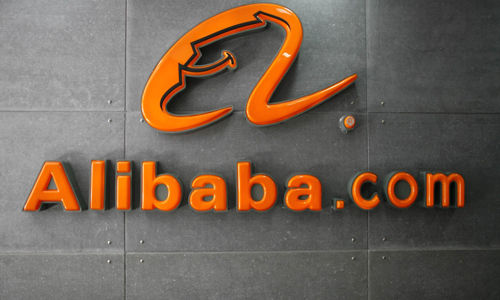Alibaba’s Magic Code Appears To Be Working

Photo Credit: hinglish Notes/Flickr.com
Recent economic results point to an economic downturn in China. Its economy grew 6.7% over the year during the second quarter, the same rate at which it had grown in the first quarter. But growth rate has fallen from the 7% level it had touched a year ago and 7.9% back in 2013. Despite the worries about the economy, China’s e-commerce leader Alibaba (NYSE: BABA) doesn’t appear to be much bothered.
Alibaba’s Financials
Alibaba’s revenues for the first quarter grew 59% over the year to RMB 32.15 billion (~$4.84 billion), ahead of the market’s forecast of $4.5 billion. This was the highest growth in revenue recorded by the company since it went public last year. EPS of $0.52 was also ahead of the Street’s forecast of $0.38 for the quarter.
During the quarter, revenues from Core commerce came in at RMB 27.24 billion (~$4.1 billion) with China retail marketplace growing 49% to RMB 23.38 billion (~$3.52 billion) primarily driven by the 54% growth in online marketing services. Gross merchandise volume in the Chinese retail marketplaces, including Taobao and Tmall, grew 19% over the year to $76 billion. Mobile revenues increased 119% to $2.64 billion with monthly active users growing 39% to 427 million. Annual active buyers increased 18% over the year to 434 million.
Alibaba is also making impressive progress within the cloud segment. Revenues from the cloud computing segment grew 156% over the year to RMB 1.24 billion (~$187 million) driven by growth in paying customers. Alibaba’s cloud service may still be a fraction of Amazon’s AWS revenues, but given the Chinese regulations, it will be a while before Amazon gets to make a mark in the sector in China.
Alibaba’s media segment revenues grew 286% over the year to RMB 3.14 billion (~$472 million) primarily due to the consolidation of Youku Tudou and the increased adoption of mobile value-added services including mobile search, news feeds, and game publishing.
Finally, its innovation initiatives and others segments saw revenues grow 30% over the year to RMB 535 million (~$80 million).
Alibaba’s Growth Plans
Alibaba appears to be going full steam ahead following its mobile and cloud strategy. Alibaba has already managed to successfully implement its mobile solutions as is evident from its numbers. Mobile accounts for nearly 75% of its core revenues compared with 51% share a year ago. During the quarter, mobile monetization rates grew 0.6 percentage points over the year to 2.8% and exceeded desktop monetization rates for the first time.
And now, it is focusing its energy on the cloud segment. During the quarter, it recorded impressive growth in the cloud at 156% over the year. Analysts expect the cloud business to be well on track to becoming a billion dollar run rate segment. Alibaba is working on that target by partnering with bigger international players to get them to use its cloud to reach Chinese customers. The Chinese market is largely untapped for the bigger players and Alibaba positions itself as a platform for these firms to reach customers in China. In April this year, it announced a partnership with Accenture that will integrate Alibaba Cloud with Accenture’s Infrastructure-as-a-Service (IaaS) solution to offer cloud-based third-party solutions onboard the Alibaba Cloud platform. It entered into a similar agreement with SAP that will help enterprises to simplify their IT infrastructure, realize business value, and accelerate digital transformation within China.
Besides cloud services, Alibaba is also entering into agreements with companies to leverage infrastructure. Recently it entered into a first-of-its-kind deal with HTC that will require Alibaba to build the necessary data center infrastructure to deliver virtual reality content to HTC’s VR customers. The agreement is expected to help accelerate VR content creation in China to allow players like HTC to make their mark in the virtual reality market.
Alibaba’s International Growth
Meanwhile, within its core retail business, Alibaba continues to forge ahead in international markets. In the previous quarter, Alibaba announced the acquisition of controlling stake in South Asian e-commerce startup Lazada for $1 billion. Singapore-based Lazada group is a popular e-commerce platform in the South-East Asian countries of Indonesia, Malaysia, Philippines, Singapore, Thailand, and Vietnam. The financial metrics for Lazada are not known, but the deal will help Alibaba expand its reach in these populous markets.
Additionally, rumors continue to prevail about Alibaba and its Paytm partnership in India. According to news reports, Alibaba has initiated discussions with Paytm to either fully acquire or own a sizable share in the company’s marketplace business Paytm Mall. Analysts expect Paytm’s parent company One97 to hive off Paytm Mall into a separate entity to make it easier for Alibaba to complete the acquisition. Reports suggest that Alibaba is planning on launching TMAll, its e-commerce site in India, within six months, and the Paytm Mall acquisition will help achieve that objective. But Alibaba should be wary of the valuations in India. In June this year, One97 was valued at $1.5 billion. However, over the past few months, sanity has prevailed as valuations have turned more realistic. Last month, Flipkart’s Myntra announced the acquisition of another Indian e-commerce player Jabong for $70 million – a deal expected to be at a significant discount considering that Jabong was valued at over $500 million back in 2013.
The market was fairly pleased with the company’s performance. Its stock is trading around 18-month high levels of $98.35 with a market capitalization of around $245 billion. It had fallen to a 52-week low of $57.20 in September last year.
More investigation and analysis of Unicorn companies can be found in my latest Entrepreneur Journeys book, more




Thanks for sharing